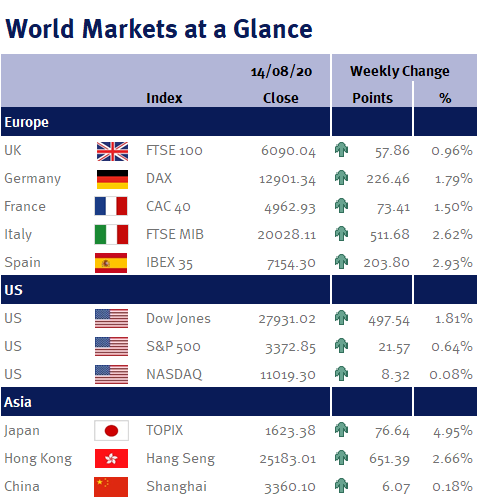For example, in the US the Republican and Democrats continued to play brinkmanship at the expense of hard-hit American workers and failed to agree a new US fiscal stimulus package ahead of their August recess. While Donald Trump sanctioned Hong Kong Chief Executive, Carrie Lam, over the crackdown in Hong Kong and signed an Executive Order banning the popular Chinese apps, TikTok and WeChat over national security grounds.
However, while it would appear that Donald Trump is further ratcheting up tensions with China, it is worth noting that this is happening, not just ahead of the November Presidential elections, but also ahead of this coming week’s meeting between the US and China to assess their Phase 1 trade deal – and as we have previously stated, Donald Trump’s get-tough rhetoric resonates well with American voters angry about Chinese trade and the coronavirus outbreak.
Additionally, despite Donald Trump’s posturing, we don’t believe he will want to jeopardise the trade deal as this would harm the US economy and American farmers in particular – and given his TikTok and WeChat Executive Orders don’t come into effect for 45 days, this looks to us to be a classic Donald Trump negotiation tactic as it can be easily reversed.
Furthermore, the US Treasury Secretary, Steven Mnuchin, recommended that as Congress had failed to reach a rescue package agreement, Donald Trump should sign an Executive Order to help Americans cope with the economic fallout from the coronavirus outbreak, by restoring unemployment assistance, suspending payroll tax and halting evictions.
This week’s positive economic data included the US ISM manufacturing survey which came in at 54.2, up from 52.6, as factories boosted production thanks to a big increase in new orders as the reading jumped from 56.4 to 61.5. While today’s (Friday 7 August 2020), non-farm payroll data, showed that the US employment market continues to recover despite the resurgence of coronavirus cases. US employers added 1.76m workers to their payroll (smashing expectations of just 1.48m), and in the process reduced the unemployment rate to 10.2% – and of particular importance to note, the job gains were broad-based with an especially large increase in leisure and hospitality (which have been particularly hard-hit by the coronavirus outbreak).
Please continue to read next week’s commentaries as we have a busy (and market moving) economic calendar ahead.
Once again, all eyes will be on the weekly US Jobless Claims data on Thursday (13 August 2020). Other key US data releases include CPI inflation, retail sales, industrial production and the University of Michigan consumer sentiment.
Elsewhere, we have UK employment data (unemployment rate and average earnings); UK and Eurozone Q2 GDP data; UK and Eurozone industrial production; Chinese CPI; and Chinese retail sales.
Investment Management Team


